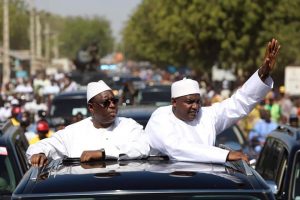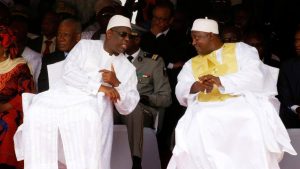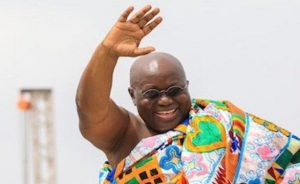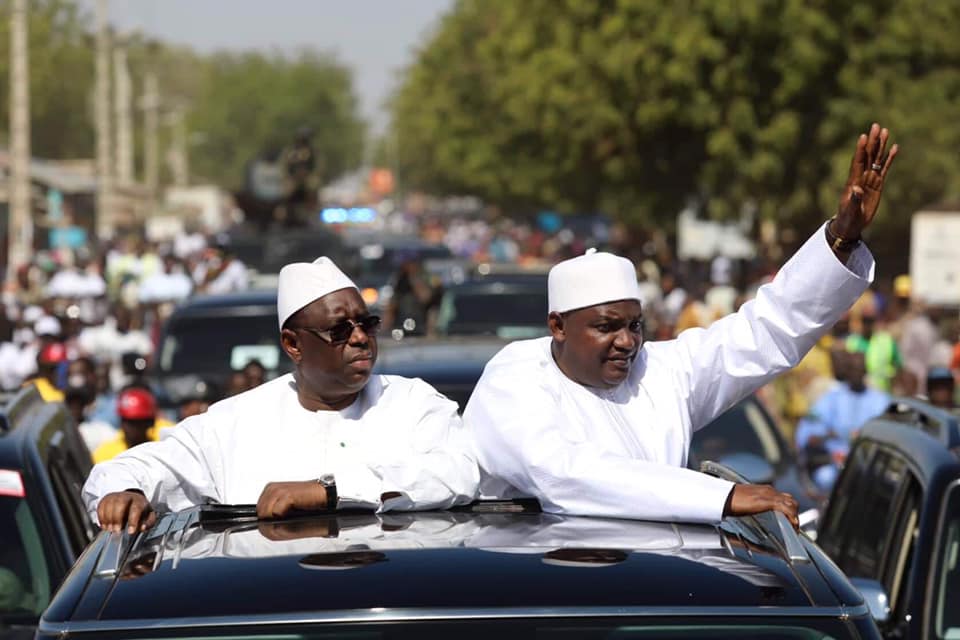 Part 1
Part 1
by Alagi Yorro Jallow
Fatoumatta: The President, in times of war, great leaders emerge. And so are the weak leaders. History records the leaders that rose to the occasion or failed to act or show leadership. In times of war, leaders do not delegate war powers to Ministers or other State functionaries. The President does the significant work and is visible every day. Ministers, Police, and the Army are left implementing, national directives only come from the President.
Across the world – from parts of the United States and China to countries including Ghana, Senegal, South Africa, and the United Kingdom, Government-mandated emergency powers in place to slow and defeat the spread of Coronavirus. All have been declared, and all have been made necessary, based on medical and scientific evidence. The guidance of the Gambia Government’s medical specialists is to advise on the protection of the Gambian citizens, assist with information regarding the risk and severity of the disease also assist in how to combat and prevent the deadly virus spreading. Also, take steps to contain the virus, treat the affected, and prevent an escalation of the disease.
Fatoumatta: We are in a war emergency: Eminent scientists say otherwise: “Dr. Richard Hatchett, Head of the International Coalition for Epidemic Preparedness Innovations (and former Director of the US Biomedical Advanced Research and Development Authority) has said, ‘War is an appropriate analogy.’ and “Professor Anthony Fauci, Director of the United States National Institute of Allergy and Infectious Diseases and member of the White House Coronavirus Task Force, has said of the battle against the pandemic: ‘It is almost like the fog of war.”
Fatoumatta: What is the Gambia’s strategy against the Coronavirus?


President Donald Trump of the United States of America, Prime Ministers Boris Johnson of the United Kingdom, Pedro Sánchez of Spain, and Giuseppe Conte of Italy have all invoked the State of Emergency Powers of World War II. The Gambia was not there then, but mercifully, our 1997 Constitution gives us same powers Section 34 of the Constitution that empowers the President to declare a State of Public Emergency and section 35 calls for the enactment of an Act spelling out the State of Public Emergency powers that could be exercised in a period of the emergency. The State of Emergency Powers Act spells out the powers that the President could exercise through the publication of emergency regulations and restrictions. The State of Public Emergency powers and regulations may curtail the exercise of certain fundamental rights.
Fatoumatta: In declaring State of Public Emergency Powers, President Adama Barrow gets the legal cover to exercise the powers of a medieval monarch contained in our presidential system of Government, an imperial president with broad overarching powers. The maxim Rex Non-Potest Peccare (the King can do no wrong) will be applicable. Like the four leaders afore-mentioned, the State of Public Emergency Powers allows the President to among other things: Do targeted lockdown; quarantine individuals or a whole section of the country; waive taxes, bills, and rents; commandeer private factories to produce medical supplies; convert private hospitals and institutions including hotels into public hospitals and mortuaries and use the Army for local security.’
Fatoumatta: As for the legality of the State of the Emergency Powers, the Government of the Gambia’s primary duty in law and action is the defense of the people of the Gambia. We face a global pandemic. The Gambia is now affected. The scientific and medical guidance the world over is transparent: the way to defeat the virus is to halt its spread through the limitation of the movement of people.
Moreover, in a State of Public Emergency, the President can also end corruption, robberies, cattle rustling, and other national bad manners. Emergency Powers are used to fix other pending problems. Furthermore, anyone who violates Emergency Powers is charged under the laws of the Gambia, including those violating quarantine rules.
Fatoumatta: Facing a global pandemic is equivalent to an existential threat to a nation. As China and Europe were attacked and imperiled by Coronavirus, the Gambia and Africa generally were safe. We thought Africa was safe by divine providence. However, God hates stupidity as we let our guard down, and Coronavirus came calling. Now that we are in this situation, we have to find our way out of it.
At the moment, the Government is fighting Coronavirus using the State of Public Emergency Powers and the Public Health Act as well as the Quarantine Act. The Public Health and the Quarantine Act is wholly inadequate and archaic for this Coronavirus pandemic. Though the Minister for Health has the enthusiasm, he does have the legal tools now with the State of Public Emergency Powers and the colonial Quarantine Act. The forced quarantines of COVID-19 patients are lawful despite the archaic underpinnings of the Act, even health and security authorities are getting excited empowered and shutting down worship places, public gatherings enforce social distancing and quarantining people suspected of carrying the virus.
Fatoumatta: Gambians had hoped to get an answer when President Adama Barrow addressed the Nation on March 27, 2020. What we heard instead was a sanguine speech full of moral exhortation and equivocations.
Fatoumatta: The President announced the state of public emergency measures. He spoke expansively on the sacrifices that the frontline department of health staff make but gave no carrots that might enthuse them to make even more sacrifices in the coming months and years. He placed imperious restrictions on how and when people can move in the country but left vague much that matters. His handlers have since been scrambling, trying to finesse his meaning. The President called for Gambians to tap into the creativity of our people but left it unclear what the country’s state of readiness for the coronavirus pandemic is. What, in other words, is the context for the exercise of creativity?
President Adama Barrow will not say what budget re-alignments his Government will make to free resources for the crisis. He will not disclose what, if anything, his epidemiologists have told him about the evolution of the disease in the next few weeks. He will not say what diplomatic efforts are underway to get help. He will not reveal the status of our national stores: for food, for antibiotics, and for drugs to manage COVID-19 symptoms. If restrictions are meant to make testing easier, President Barrow gave no hint of whether the Gambia has adequate testing kits.
President Barrow gestured faintly to the needs of the vulnerable, but the paltry GMD 500 million that he has set aside for the Department of Health in combating and preventing the coronavirus outbreak is a desperate drop in an ocean of destitution. What other monies has he offered? Most charitably, President Barrow’s speech was like a fire-bell in a Stygian black-out of hopelessness: Gambians have no idea whether the fire-brigade will come to the rescue; whether the fire-trucks have water to douse the flames and whether they are safer inside their homes or outside.
Fatoumatta: Even worse, the President’s measures are dangerous as well as weak and ineffectual. They are dangerous for giving the false public hope that there is meaningful action underway. Moreover, they are weak and ineffectual because none of what President Barrow promises can be enforced.
Fatoumatta: Adama Barrow has two problems, both of his own making. One, since the crisis broke, he has treated the Coronavirus as a medical problem and farmed it out to Dr. Ahmadou Lamin Samateh, the Minister for Health. Two, Adama Barrow appears to think that his Government can fight this epidemic without a strategy. He is wrong on both fronts: the crisis he faces is one of governance, not medicine, and to lead on it is his job, not the health minister.
There are only three medical elements to this crisis: tests, treatment, and quarantine. Everything else that is necessary to contain the disease: Social distancing, restrictions on movement; contact tracing; kiting out places of quarantine and testing; keeping supply chains for essential goods open; providing essential services in lockdown; protecting the vulnerable; managing food reserves as well as identifying food deficit areas and organizing logistics to supply food where it is needed; enacting special purpose laws for the crisis, say emergency appropriations; tax exemptions for critical businesses; measures to keep the general economy going; how and when to deploy the security forces, including the Army; closing or opening borders and arteries of commerce, and much else besides, are all governance issues. The countries that have beaten back the Coronavirus understood this from the very first.
Thus, to the Adama Barrow’s second problem: trying to manage the epidemic the way he has managed dissimilar crises in Foni, Faraba, and Kauntar in the past, that is, by winging it. He will fail, and Gambians will die needlessly. As a governance problem, the Gambia’s effort to fight COVID-19 fragments into many moving parts that span the boundaries of the bureaucracy. However, ministries are often goal-incompatible: the one for the industry might disagree with that for an environment where factories should be built, for example. When there is goal-conflict or a problem calls for all of the Government to act- as COVID-19 does- it is the President’s job to make sure that all work to a common purpose. There must be clarity and co-ordination. That means that the President must set clear goals and frame objectives for his ministers that are clear and achievable. He must define the right actions to achieve the objectives, fund those actions, assign them to someone, and make it clear to officials how they will be held to account. After that, his job is to track progress against the targets and results that he wants and, if needs be, to knock laggards on the head and sack persistent failures. In short, Adama Barrow must have a strategy. However, and this is the problem, Adama Barrow acts as if he does not have to.
That, unfortunately, is a deadly tryst with fate. If he is not sure what to do, he has piles of excellent ideas from his impressive Ghanaian and Senegalese peer, President Dankwa Nana Akufo-Addo and President Macky Sall.
Fatoumatta: Adama Barrow gets apoplectic when western examples are held to his eye, but the experiences of a comparable African nation should give him pause. Like Adama Barrow, Mr. Akufo-Addo initially failed to grasp the mortal danger posed by the Coronavirus to the health of his people and the economy of Ghana. Since he learned the peril that Ghana faced, Mr. Akufo-Addo has shaken his Government out of its torpor. He now provides decisive and visible leadership, keeps focus on the mission, continually reminds Ghanaians of his five anti-COVID-19 objectives, and gives regular updates on his efforts. Since March 10, he has made five national addresses, all of them matter-of-fact affairs admirably free of moral dross.
To be Continued. See Part II.

